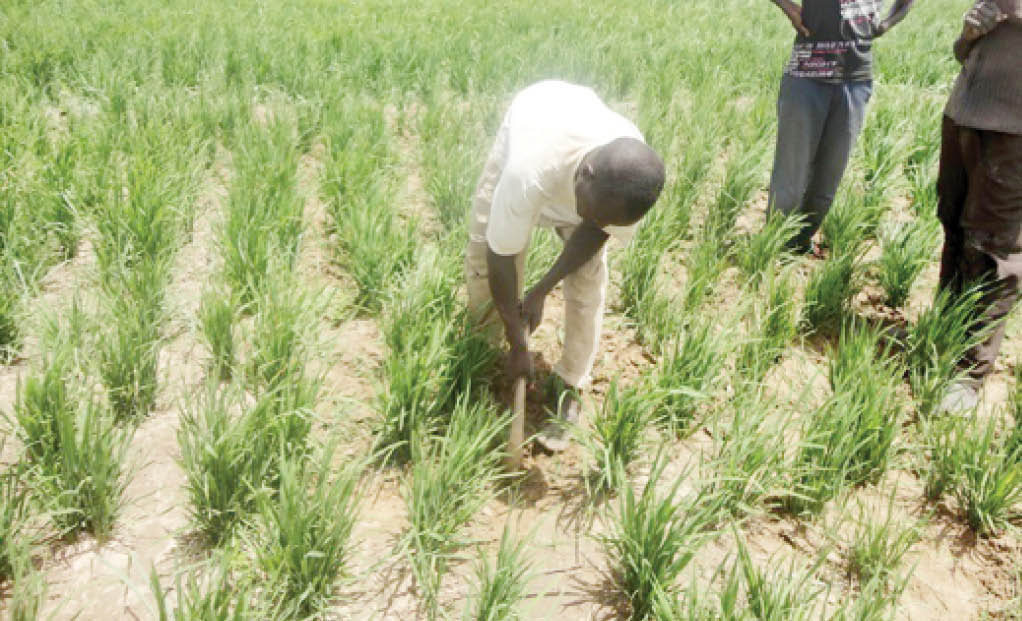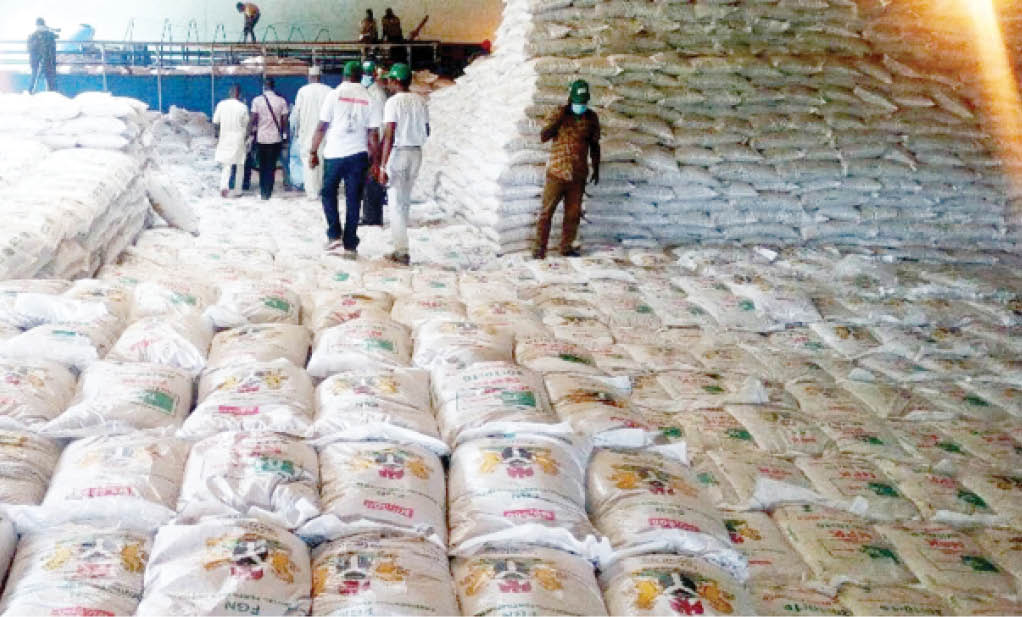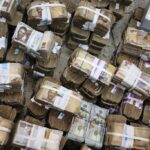There are growing concerns among farmers and other stakeholders in the country that the scarcity of fertiliser may pose a serious threat to food security.
The high cost of fertiliser is said to be forcing many farmers to look for cheaper and adulterated options.
Currently, a 50kg bag of NPK 20:10:10 is sold between N43,000 and N48,000; while NPK 15:15:15 is between N50,000 and N56,000 depending on the location. The same bag was sold between N25,000 and N26,000 in 2022.
Urea, which is considered cheaper, is being sold between N36,000 and N40,000.
- Minimum wage: Civil Servants To Govs: Cut Your Salaries To Pay Us
- Farmers turn to prayers as rainfall ceases in Taraba
The Fertiliser Technical Working Group said in the last four years, the hike in the price of fertiliser, had been caused by the shortage of urea supply, a critical raw material component for the NPK blends.
The Executive Secretary, West African Fertiliser Association (WAFA), Dr Innocent Okuku, in an interview with Daily Trust, said that fertiliser consumption trends have shown that application by smallholder farmers that produce most of the cereals in the country is getting lower because of the issues around availability and cost.
According to him, there is an important nitrogen gap causing the yield of farmers in the country to drop significantly; a situation, he noted, calls for urgent government attention.
He explained that in situations where farmers are expected to use NPK, they are now using urea instead of NPK, saying “It is a problem for the cereals as both fertilisers have their roles in crop development.”
The President of the All Farmers Association of Nigeria (AFAN), Architect Kabiru Ibrahim, attributed the low usage of fertiliser by farmers to “unaffordability” because prices are too high.
“After several concerns raised at different forums, we are now seeing some small reduction of the price of urea, but we believe a little more pressure from the government will yield more results from the manufacturers of urea.”

A position document titled ‘Availability of Urea for Blending of NPK: A Matter of National Security’, jointly signed by Sadiq Kassim, President, Fertiliser Producers and Suppliers Association of Nigeria (FEPSAN); Samuel Ali, a senior fertiliser market specialist at the International Fertiliser Development Centre; Dr Innocent Okuku of the West Africa Fertilisers’ Association (WAFA) and Iruansi Itoandon of Portfolio Manager (PFI) and the Nigeria Sovereign Investment Authority, said that the consumption rate of the fertiliser in the sector is far below its potential.
They said: “The utilisation of the blending capacity of the country has been, on average, very poor (< 15%). Yearly reviews of the sector by the Fertiliser Technical Working Group have shown a consistent shortage of the supply of Urea – a critical raw material for blending NPKs. In the last 4 years,
Urea has been the principal cause of the scarcity.”
The experts also expressed concern that “A substitute for nitrogen (N) from urea, ammonium sulphate, is being imported, increasing forex demand on available nutrients, with the additional risk of introducing higher sulphur than required in our soils, leading to higher acidity.”
On the way forward, the experts urged the federal government to prevail on urea producers to meet an annual supply quota to the local market.
“Rather than allow the local producers to index their prices on international prices, the Nigerian government should negotiate with urea producers a price of locally supplied urea that reflects the concessions (gas and other fiscal concessions) made to the producers; the food security ambition of Nigeria, and a margin that is adequate for the producers,” the position document signed by the four experts recommended.
They also advised the government to implement a penalising export tax regime on urea export for producers who fail to meet the yearly urea quota for the local market.
The latest food security analysis report by the Food and Agricultural Organisation (FAO) and the World Food Programme (WFP) of the United Nations, titled ‘Cadre Harmonisé’ said the scarcity of fertiliser problem might further heighten serious concerns over sufficient crop production as the country “Is already grappling with its fourth consecutive year of chronic food insecurity with 26.5 million people across the country projected to face acute hunger during the 2024 lean season between June and August.”
Confirming the situation to Daily Trust on Sunday, the President of the Fertiliser Producers & Suppliers Association of Nigeria (FEPSAN), Sadiq Kassim, said Nigeria is a net export of fertiliser, but consumes less fertiliser domestically. He said this could make the country face a serious food security crisis.
The Chairman of the Nigerian Agro Dealers’ Association (NAIDA), Kabir Umar Fara, warned of a major impending crisis in the sector.
Fara argued that if urea companies’ operations are allowed to continue unchecked, the nation may experience “a catastrophic food crisis.”
He asked the federal government to launch an investigation into the current hike in fertiliser and agro inputs prices in order to avert food crisis.
Fara and his counterpart from FEPSAN, Sadiq Kassim, spoke at a press conference in Kano, on the plight of farmers on the hike of agro inputs and fertiliser.
The duo lamented the hike in the price of fertiliser, especially urea, by the giant accredited companies.
“These companies, especially urea giants’ companies in Nigeria such as Dangote, Indorama, and Notore among others, have a combined capacity of nearly 6m tons annually.
“But this year, they have deprived Nigerian farmers of their products, which were believed to be smuggled out of the country as against the March 2022 agreement that was duly signed and sent to the National Security Adviser (NSA), which stipulates that the said companies must reserve at least 35% of their products for the Nigerian market.
“Therefore, I urge the Hon. Minister of Agriculture and the National Security Adviser to carefully look into this and do the needful before it further plunges Nigeria into a more devastating food crisis, food security as well as national security, which are the backbone of our dear country,” he said.
“It is very important to call the attention of the federal government to investigate the reasons for the high cost of fertiliser, especially Urea fertiliser in Nigeria. The international price is N25,000; while it is N32,000 or N40,000 in some parts of the country,” Fara said.
He also urged the government to expand its horizon and issue licences to whoever wants to import fertiliser with a view to creating strong and healthy competition that may result in the reduction in fertiliser prices in the country.
Reacting to the issue, Dr Jossy Nkwocha, Head of Corporate Communications/Special Adviser to the Managing Director at Indorama, told Daily Trust on Sunday that “It is not true that if there is any short supply, the fault is coming from us. The only problem we have is feedstock. Feedstock means gas. If we have enough gas, we will be producing to our optimum capacity.”
He said that gas supply has not been consistent to the plant, making it “Extremely difficult to operate at the best level and with gas prices denominated in dollars, it is difficult to sell below the cost of production.
Nkocha said Indorama has also started the production of NPK in its Kaduna plant.
Also reacting, the Group Head of Corporate Communications, Dangote Group, Anthony Chiejina, said the allegation that urea manufacturers are focusing more on the export market than domestic supply was “absolute falsehood.”
“We, as I can tell you today, focus on the local market. We try as much as possible to make sure that what we are selling is affordable and very competitive and the best in the market.
“Because of our concern for farmers and for food security, we try as much as possible to lower our price. Our price is the cheapest so far in the market regardless of the fluctuations in the market,” Chiejina told Daily Trust on Sunday.
He attributed the high cost of fertilizer to inflation which, he noted, is not peculiar to Nigeria.
“If you look at the total scenario, tell me anything that the price is stable. That is a major issue. Everything you can think of in this country. But one thing is clear and people should know; this thing is not Nigeria-specific. It’s a global phenomenon. All over the world, inflation is taking a toll on every economy,” he said.
We’re strengthening local organic fertiliser system – FG
The Minister of Agriculture and Food Security, Senator Abubakar Kyari, said the federal government was seeking to strengthen the organic fertiliser system “Which inputs are sourced locally as alternative.”
He told reporters in Abuja that the country’s fertiliser sector faced serious threats as access had dropped due to availability and cost.
Kyari said affordability of NPK was greatly affected by availability of urea, a major input for its blending, admitting that “Fertiliser prices have tremendously gone up.”
The minister said the federal government invited Dangote and Indorama companies for discussions.
He said the government was made to understand that gas supply, which is priced in dollars, was the major trigger as the value of the naira declines, in addition to other components which are import-based.
Kano farmers decry high cost of inputs
As the 2024 wet season sets in, farmers in Kano State have decried the high cost of agricultural inputs.
One of them from Dutsen Amare of Gwarzo Local Government Area, Yahuza Dauda, said they had resorted to the use of manure.
“If you go around, you will find out that many farmers have reduced their farmlands, some have rented some portions to people coming from the city to farm. This will enable them to get some money to face the wet season. Imagine, a kilo of certified seed selling at N2,000 and a bag of urea fertiliser is now selling at N37,000 per 50kg while NPK fertiliser is selling between N23,000 and N30,000 depending on the brand. This has made it very difficult for many of us to cultivate as we used to,” he said.
Another farmer in Kura, Shehu Faruku, alleged that the government had neglected the sector completely and farmers were left at the mercy of foreign donor agencies assisting them with skills and some other things.
Isa Aminu Bunkure, a farmer at Unguwar Kwari village of Bunkure Local Government Area, said: “What is happening in the agricultural sector across the nation is a sign of a food crisis and if care is not taken, the situation will be worse.
“What is happening this wet season is not a good omen at all; farmers are facing a serious challenge that would affect everyone.”
The Kano State Chairman of the All Farmers Association of Nigeria (AFAN), Abdulrasheed Magaji Rimingado, in a chat with Daily Trust, said: “It is unfortunate that government attention is not on the farmers.
“Sadly, with the current situation in the food security sector where people cannot afford three meals a day, the government is busy elsewhere. Our farmers are no longer after mechanisation or training, what they are after is access to affordable and qualitative inputs. Unfortunately, these inputs are gradually becoming something a common farmer cannot lay his or her hands on.
“The smallholder farmers you are seeing produce more than 50% of the nation’s food production level, and any neglect means chaos in the sector.”
He said his association was able to get into an agreement with some fertiliser blending companies to secure a subsidy for members.

 Join Daily Trust WhatsApp Community For Quick Access To News and Happenings Around You.
Join Daily Trust WhatsApp Community For Quick Access To News and Happenings Around You.


